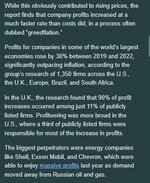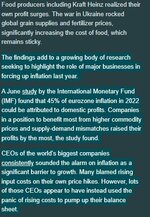Derec
Contributor
I did not even hear of Ahold Delhaize. I looked them up, and they do not seem to own anything in the Atlanta area.Until the 1990s, most people shopped in local or regional grocery stores. Now, just four companies – Walmart, Costco, Kroger and Ahold Delhaize – control 65% of the retail market.
Our major grocery stores are Publix and Kroger. Publix is a southeastern chain and is not owned by a major conglomerate - in fact it is employee-owned. I guess you can call that a "regional grocery store". Of course Walmart and Target sell groceries too. There are also smaller chains such as Aldi (which also owns Trader Joe's), Lidl, H-Mark and Nam Dae Mun, which I think only has stores in the Atlanta area. We are is the south so there are of course a few Piggly Wigglys and other smaller chains here and there.
Then there are truly local stores like Your DeKalb Farmer's Market on Ponce (great selection of produce and meats) and specialty stores like Spotted Trotter for meats or Kathleen's Catch for fish and seafood. We even have traditional farmer's markets where sellers rent booths. There is one close to me every Thursday.
Yes, the consolidation behind the scenes (like meat processing) is more concerning than the retail sector itself.A spate of mega-mergers means that meatpacking plants are now controlled by just a handful of multinationals including Tyson, JBS, Cargill and Smithfield (now owned by the Chinese multinational WH Group).
What do you think the government can do to lower barriers to entry for new players in this space?
2020 was the Pandemic year. Any year-to-year comparisons involving it are highly sus. How was JBS' revenue in 2019 vs. 2018? What about profits rather than revenue?Consumers pay more while profits for mega meat processors are booming: in 2020, the Brazilian firm JBS reported $51bn in revenue – a 32% rise compared with the previous year.
Certainly, cane sugar sweetened sodas taste better. And I agree that growing corn for fuel ethanol is a bad policy, but this line about "toxic pollutants" is just stupid. Ethanol is cleaner-burning than gasoline itself. Bacteria-fermented ethanol (or, even better, butanol) from waste biomass or direct-air-captured CO2 would be, I think, a good synfuel for applications (such as jet fuel) where electric propulsion is not feasible.Very little corn grown in the US is eaten these days. Instead, more than 99% goes into animal feed, additives like corn syrup used in sugary junk food and, increasingly, ethanol, which produces toxic air pollutants when burned with gasoline.
And this is the issue when a presidential campaign runs on coconut memes and brat vibes. Do we even know what Harris/Walz position on various agricultural subsidies is?It’s a cruel paradox, according to some campaigners, as subsidies incentivise farmers to grow just a handful of cash crops, a practice that floods the market, depresses prices and keeps them hooked on government aid.
Snipped the rest, as this reply was getting long anyway, and I need to go to bed.
Last edited:





